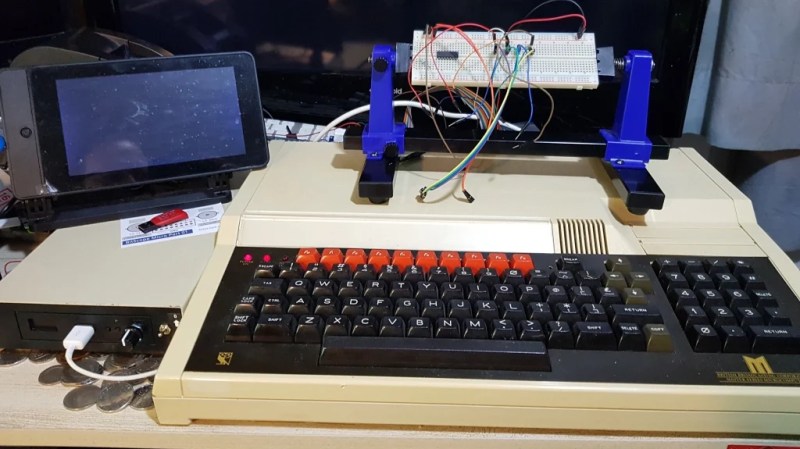[Peter Mount] had a simple problem. He’d treated himself to a retro purchase in the form of a BBC Master 128—a faster sequel to the BBC Micro Model B. The only problem was he needed a way to get software on to it. Cue a creative hack using a Raspberry Pi Zero W.
When [Peter] received the machine, it already had a GoTek floppy emulator, which pulled disk images off a USB drive. However, he wanted an easier and quicker way to get disk images to and from the machine for development purposes. Swapping the USB drive to and from another machine seemed too tedious.
Instead, he decided to swap in a Pi Zero W for this purpose, setting it up to emulate a flash drive by following instructions from MagPi Magazine. This would allow him to use the SCP tool to copy disk images over to the Pi Zero W via its WiFi connection. Basically, the Pi Zero W was acting as a wirelessly-updated storage device hooked up to the GoTek floppy emulator.
It’s a nifty way of doing things. [Peter] could have set about creating his own floppy emulator from scratch with wireless capability included. However, there was no need. He just needed a wirelessly-accessible USB drive, and the Pi Zero W was more than happy to act in that role.
The BBC Micro is a beloved machine of many in the British Isles, and it had rather an extended family. If you’ve pulled off your own nifty hack on this classic machine, be sure to hit us up on the tipsline!
















I’ll add that this isn’t just for the BBC Micro as it works for anything you can connect a GoTek to.
I’ve used this on my Commodore Amiga A1200 and Sinclair Spectrum +3 with no issues
“The only problem was he needed a way to get software on to it.”
When I was a kid, if we wanted software on our computer, we had to type it in ourselves. From books and magazines, or write it ourselves, then fix all the bugs. Back then it was uphill to school in the morning, and uphill to home at night. Kids these days….
That’s nothing. We ‘ad a ZX81 with a wobbly RAM pack. One sneeze and we ‘ad to type the ‘ole lot in again.
I invested in some blutack ;-) ! Only kidding, my best solution was to mount the ZX81 on a book with the 16K RAM pack hanging off the end. Because the RAM pack could never touch the desk, it could never flex and disconnect. A sudden shock could still cause a reset though!
16KB RAM? Pure bloody luxury!
You need a wobble stopper!
https://oldmachinery.blogspot.com/2020/09/zx-workstations.html
I didn’t have money for a wobble stopper, but a friend did make a bunch of homemade wooden versions and given them out. They did improve the ergonomics (slightly) and reduce ram pack wobble issues.
There were third-party replacement chassis with a mechanical keyboard.
You could install the whole ZX81 in it, along with a PSU and the RAM pack, I think.
I think that was a good option for ZX81 enthusiasts.
If I was around at the time, I would have considered buying it.
Being able to play “3D Monster Maze” more comfortable would have been a reason enough.
Exactly! But it in my case it was a CBM 64 :)
All these years later and I still have theat machine … and a degree in Electronic Engineering
I do have a bit of a hate/love relationship with this one.
For one it’s a very buggy, limited machine that was cheaply mass produced.
On other hand, it’s amazing how the users managed to workaround all the given limitations and shortcomings over the years.
Also.. The SID chip. Cute little something. ❤️
Exactly, but in my case it was the CBM64.
All these years later and I still have that trusted machine, a degree in Electronic Engineering and a career..
I love that people are still tinkering with these wonder machines and interfacing them with their modern day equivalents.
I look forward to the next generation of engineers crediting the start of their career to the likes of the Arduino and raspPi.
May it ever be thus !
… in the snow, both ways …
I like this, purely because of the Acorn -> ARM history. It’s like a great great great grandchild coming to the rescue.
You can connect quite a number of Arm processors to a BBC micro. Gotek, usb emulator, BeebSCSI/Pi1MHZ, RGBtoHDMI, PiTubeDirect, RS423 to ESP32 WiFi, PiEconetBridge and every single one has thousands of times the processing power of the original Beeb. It’s rather fun :)
Don’t forget the original ARM1 coprocessor!
“The BBC Micro is a beloved machine of many in the British Isles, and it had rather an extended family.”
It could even be used as an alternative to an IBM PC at some point.
The Master 512 upgrade contained an 80186 board with a copy of DOS Plus and GEM (and a mouse).
So it could run well behaved CP/M-86 and DOS applications.
dBase III, Turbo C, Pascal etc. Maybe Locomotive Basic (GEM), too?
Seriously how lazy have we become as a species when pulling a USB stick from one computer and putting it into another is “too tedious”.